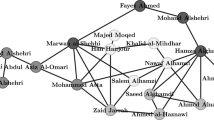Abstract
We show that computing the Shapley value of minimum cost spanning tree games is #P-hard even if the cost functions are restricted to be {0,1}-valued. The proof is by a reduction from counting the number of minimum 2-terminal vertex cuts of an undirected graph, which is #P-complete. We also investigate minimum cost spanning tree games whose Shapley values can be computed in polynomial time. We show that if the cost function of the given network is a subtree distance, which is a generalization of a tree metric, then the Shapley value of the associated minimum cost spanning tree game can be computed in O(n 4) time, where n is the number of players.
Similar content being viewed by others
References
AboElFotoh H.M., Colbourn C.J.: Computing 2-terminal reliability for radio-broadcast networks. IEEE Trans. Reliab. 38, 538–555 (1989)
Ando K., Kato S.: Reduction of ultrametric minimum cost spanning tree games to cost allocation games on rooted trees. J. Oper. Res. Soc. Jpn. 53, 62–68 (2010)
Aziz, H., Lachish, O., Paterson, M., Savani, R.: Power indices in spanning tree games. In: Goldberg, A., Zhou, Y. (eds.) Proceedings of the 5th International Conference on Algorithmic Aspects in Information and Management—AAIM 2009. Lecture Notes in Computer Science, vol. 5564. Springer, Berlin, pp. 55–67 (2009)
Bacher R.: Determinants of matrices related to the Pascal triangle. J. de Théorie des Nombres de Bordeaux 14, 19–41 (2002)
Bergantiños G., Vidal-Puga J.J.: The optimistic TU game in minimum cost spanning tree problems. Int. J. Game Theory 36, 223–239 (2007)
Bird C.G.: On cost allocation for a spanning tree. A game theoretic approach. Networks 6, 335–350 (1976)
Bogomolnaia A., Moulin H.: Sharing a minimal cost spanning tree: Beyond the Folk solution. Games Econ. Behav. 69, 238–248 (2010)
Dutta B., Kar A.: Cost monotonicity, consistency and minimum cost spanning tree games. Games Econ. Behav. 48, 223–248 (2004)
Faigle U., Kern W., Fekete S.P., Hochstättler W.: On the complexity of testing membership in the core of min-cost spanning tree games. Int. J. Game Theory 26, 361–366 (1997)
Faigle U., Kern W., Kuipers J.: Computing the nucleolus of min-cost spanning tree games is NP-hard. Int. J. Game Theory 27, 443–450 (1998)
Feltkamp, V., Tijs, S., Muto, S.: On the irreducible core and the equal remaining obligations rule of minimum cost spanning extension problems. CentER Discussion Paper No. 94106, Center for Economic Research, Tilburg University (1994)
Gavril F.: The intersection graphs of subtrees in trees are exactly the chordal graphs. J. Comb. Theory Series B 16, 47–56 (1974)
Graham R.L., Knuth D.E., Patashnik O.: Concrete Mathematics, 2nd edn. Addison-Wesley, Boston (1994)
Granot D., Huberman G.: Minimum cost spanning tree games. Math. Progr. 21, 1–18 (1981)
Granot D., Huberman G.: The relationship between convex games and minimum cost spanning tree games: a case for permutationally convex games. SIAM J. Algebraic Discret. Methods 3, 288–292 (1982)
Granot D., Huberman G.: On the core and nucleolus of minimum cost spanning tree games. Math. Progr. 29, 323–347 (1984)
Hirai H.: Characterization of the distance between subtrees of a tree by the associated tight span. Ann. Comb. 10, 111–128 (2006)
Kar A.: Axiomatization of the Shapley value on minimum cost spanning tree games. Games Econ. Behav. 38, 265–277 (2002)
Kruskal J.B.: On the shortest spanning subtree of a graph and the traveling salesman problem. Proc. Am. Math. Soc. 7, 48–50 (1956)
Norde H., Moretti S., Tijs S.: Minimum cost spanning tree games and population monotonic allocation schemes. Eur. J. Oper. Res. 154, 84–97 (2004)
Rose D.J., Tarjan R.E., Lueker G.S.: Algorithmic aspect of vertex elimination on graphs. SIAM J. Comput. 5, 266–283 (1976)
Semple C., Steel M.: Phylogenetics. Oxford University Press, Oxford (2003)
Shapley L.S.: A value for n-person games. In: Kuhn, H.W., Tucker, A.W. (eds) Contributions to the Theory of Games, vol. II., pp. 307–317. Princeton University Press, Princeton (1953)
Winter E.: The Shapley value. In: Aumann, R.J., Hart, S. (eds) Handbook of Game Theory, vol. 3., pp. 2025–2054. Elsevier, Amsterdam (2002)
Author information
Authors and Affiliations
Corresponding author
Additional information
This work is supported by Japan Society for the Promotion of Science, Grant-in-Aid for Scientific Research (C) (No. 23510066).
About this article
Cite this article
Ando, K. Computation of the Shapley value of minimum cost spanning tree games: #P-hardness and polynomial cases. Japan J. Indust. Appl. Math. 29, 385–400 (2012). https://doi.org/10.1007/s13160-012-0078-9
Received:
Revised:
Published:
Issue Date:
DOI: https://doi.org/10.1007/s13160-012-0078-9




